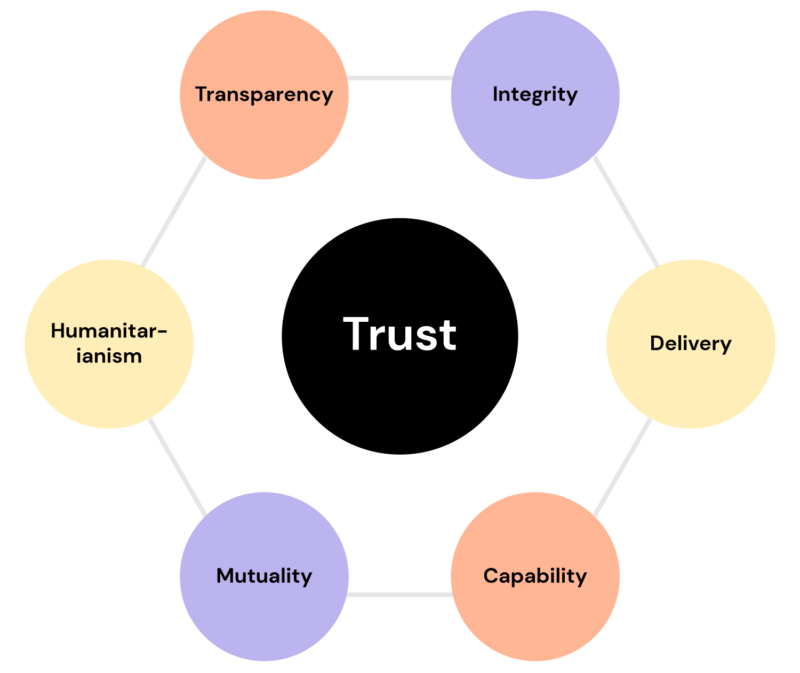linkedin.com/in/shadrachswantekambai

The Inevitable Prerequisite for Success: Trust in Individuals and Corporate Organizations
According to Ryan (2022) in Harvard Business Review, No matter the sector, market valuation, projected return on investment, or business landscape, the absence of trust possesses the innate ability to erode the foundations of any achievements deemed to be successful. Take, for instance, the aviation industry, where I accumulated over a decade of professional experience; the issue of trust has been responsible for the demise of numerous promising airlines, particularly in Africa.
Through personal observation, it has become evident that the compromised trust hinders the effective implementation of policies and the successful execution of business models by employees. Similarly, marketing endeavors may falter in gaining the anticipated momentum when trust is violated. Consequently, trust, a quality often perceived as intangible and elusive, stands as the bedrock of success, whether at an individual level or within the confines of corporate entities. This fundamental principle serves as the cornerstone for all meaningful interactions and transactions, profoundly influencing relationships with diverse stakeholders, encompassing employees, customers, the community, and business partners.
This article aims to delve into the indispensable nature of trust as a prerequisite for success, with a specific focus on its significance within the context of corporate organizations.
The investment an organization makes to gain the trust of its employees in the contemporary business landscape is invaluable, particularly in a capital-intensive industry such as airlines. cliqjets Consulting
Trust with Employees
As per Lewis (2022), “Trust represents an indispensable form of capital in the arsenal of today’s leaders. In the midst of economic volatility and global uncertainties, individuals are increasingly looking to their employers and business leaders as bastions of truth.” Within any organizational framework, the interplay of trust between employers and employees stands as a paramount factor. When employees place their trust in their employers, they tend to exhibit higher levels of engagement, motivation, and loyalty. Trust acts as a catalyst for transparent communication, nurturing a favorable work environment where employees find it natural to share ideas, voice concerns, and provide feedback.
In an environment characterized by trust, employees are more inclined to assume ownership of their roles, manifest creativity, and underscore their commitment to the company’s mission. Furthermore, the presence of trust among employees can elevate collaboration, resulting in more efficient teamwork and the fortification of a robust corporate culture.
Trust with Customers
For a business, trust is the lifeblood of customer relationships. A customer’s trust in a brand is built over time through consistent product quality, exceptional service, and a commitment to transparency. Trust encourages repeat business and customer loyalty.
When customers trust a company, they are more likely to recommend it to others. This word-of-mouth marketing can be invaluable, as recommendations from trusted sources carry significant weight. Businesses that prioritize building trust with their customers often experience higher customer retention rates and increased revenue.
Trust in the Community
Corporate organizations are deeply interwoven into the communities in which they operate. Trust between businesses and their local communities is vital. When a company is seen as a trustworthy and responsible member of the community, it enjoys a more favorable reputation. This can lead to several benefits, including greater community support, easier regulatory approvals, and enhanced access to local talent and resources.
Community trust also results in a positive brand image, which can translate into improved sales and a more robust customer base. Companies that are committed to giving back to the community they serve often enjoy a more positive public perception and build a reservoir of goodwill.
Trust with Business Partners
In the world of corporate organizations, collaboration is a key driver of success. Trust is the glue that holds partnerships and alliances together. When companies trust their partners, they can collaborate more effectively, leading to improved efficiency and innovation.
In contractual relationships and joint ventures, trust can reduce the need for extensive legal protections, simplifying the negotiation process and reducing the risk of disputes. This trust can lead to longer-lasting and more fruitful partnerships, enabling both parties to achieve greater success.
Benefits to Corporate Organizations
The benefits of trust within corporate organizations are manifold. Trust enhances the workplace culture, fostering greater employee satisfaction, productivity, and retention. Moreover, it can lead to higher levels of innovation as employees feel secure in expressing their ideas and concerns.
Trust with customers not only fosters loyalty but also leads to increased brand reputation, which can drive sales and revenue growth. Additionally, community trust opens doors for businesses, facilitating local support and enabling smoother operations.
In the realm of business partnerships, trust ensures long-lasting and successful collaborations. These partnerships can provide access to new markets, technologies, and resources, enhancing the organization’s competitive advantage.
- Fixing Aviation Surety Bonds in Nigeria
- When Safety Meets the Clock: Why Airlines Can’t Afford to Gamble
- NSIB Hosts 12th BAGAIA Commission Meeting in Abuja
- ✈️ How Commercial Airlines Boost Nigeria’s GDP
- Error Management Techniques in Flight Operations
Conclusion
In both individual and corporate contexts, trust is an indispensable prerequisite for success. Trust with employees, customers, the community, and business partners underpins a thriving and sustainable organization. The benefits of trust are numerous, ranging from improved workplace culture and customer loyalty to community support and fruitful business collaborations. As corporate organizations recognize the critical role trust plays in their operations, they are better positioned to achieve long-term success and contribute positively to their broader communities and industries.
References
Lewis, A. (2022, October 26). Importance of Trust in Leadership. Harvard Business Publishing. https://www.harvardbusiness.org/good-leadership-it-all-starts-with-trust/
Ryan, T. (2022, February 7). How Business Can Build and Maintain Trust. Harvard Business Review. https://hbr.org/2022/02/how-business-can-build-and-maintain-trust





0 Comments